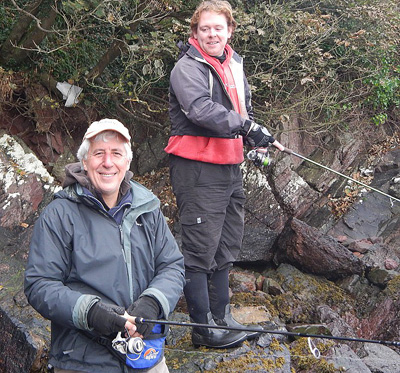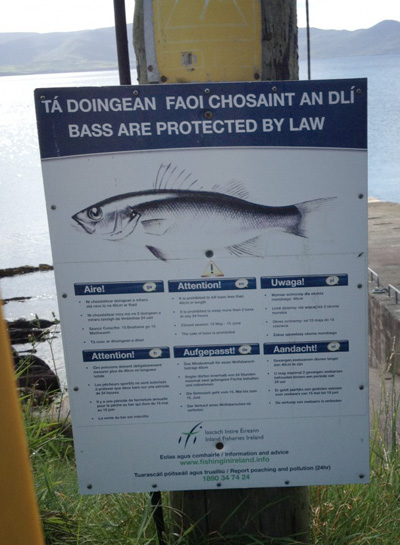With surveys continuing to show bass stocks plummeting beautiful fish like the one above could become a rare sight – although perhaps not in Ireland, where this one was caught – as they had the sense to ban commercial bass fishing and adopt sensible conservation policies.
I make no apologies for returning to the campaign to protect bass stocks in the UK. The Angling Trust continues to work with our colleagues in the Bass Anglers Sportfishing Society (B.A.S.S.) to persuade our politicians of the plight of British bass and the need for action, not just at a European level but in our inshore waters as well.
We have been well supported in these efforts by prominent figures in the bass world including Matt Powell from Wales and Henry Gilbey who recently wrote a great blog, which you can find HERE
 Successive Fisheries Ministers from both sides of politics have been well aware of the increasingly parlous state of bass numbers and the long overdue need for the introduction of measures to prevent a catastrophic stock collapse. Sadly, it now seems that this collapse could be about to happen. The results from the recent Solent bass survey in the English Channel confirm that there have been five poor year classes in a row (2008 – 2012) which offers a bleak prospect for the future.
Successive Fisheries Ministers from both sides of politics have been well aware of the increasingly parlous state of bass numbers and the long overdue need for the introduction of measures to prevent a catastrophic stock collapse. Sadly, it now seems that this collapse could be about to happen. The results from the recent Solent bass survey in the English Channel confirm that there have been five poor year classes in a row (2008 – 2012) which offers a bleak prospect for the future.
With the exception of Labour’s Ben Bradshaw, who tried unsuccessfully to raise the ridiculously inadequate bass minimum landing size (mls), and the Conservative’s Richard Benyon, who instigated the current mls review, other ministers have been reluctant to either heed the warnings or to follow scientific advice. This is partly because the commercial sector consistently sets its face against any restrictions on their activities and they are effective lobbyists to which politicians have become accustomed to listening. However, we are hoping that the current incumbent, George Eustice, will be prepared to grasp the nettle and introduce long overdue conservation measures for this most iconic of sport fish.
The reason we are now in this unhappy place is because for the last ten years our politicians have been ignoring the evidence from both the International Council for the Exploration of the Seas (ICES) and their own scientists, and listening instead to the loudest and most self-interested voices. The scientific advice from ICES in 2013 for a 36% cut in total catches was not acted upon and now the latest recommendation is for an 80% cut in catches of bass across the EU in 2015. Increasing commercial fishing effort and successive years of recruitment failure are cumulatively driving bass stocks towards a precipice. Unless action is taken immediately to protect the remaining stock a total moratorium on bass fishing in Europe will soon be the only option available to protect and restore this important fishery.
A collapse in bass stocks or a total moratorium on all forms of bass fishing would be disastrous for recreational sea angling which, according to Defra’s own Sea Angling 2012 report, shows there are 884,000 sea anglers in England who directly pump £1.23 billion p.a. into the economy and upon which 10,400 full time jobs are dependent. If induced and indirect impacts are taken into account these figures soar to £2.1 billion and 23,600 jobs. The VAT alone which is collected from sea anglers dwarfs the entire value of all commercial fish landings in England.
In purely economic terms, we would be better off if bass were retained as a line-caught species with the bulk of market demand met by farmed fish. This would immediately revive the UK fishery for both the inshore under ten metre commercial fleet, who would be in position to provide a premium product caught in a sustainable way, and the recreational sector – the majority of whom practice catch and release.
Will Europe Deliver?
Despite some encouraging signs that the European Commission has finally woken up to the unfolding disaster that is happening across the North Atlantic Fishery we remain concerned that their proposals will inevitably get watered down once the commercials get to work on their individual parliamentarians.
A number of welcome measures are on the table at the moment and relate to the main bass stock in the Celtic Sea, Channel, Irish Sea and North Sea. The interested Member States (i.e. France, UK, Netherlands, Ireland, Belgium, Spain and Portugal) agreed on the following key factors:
• acceptance of the assessment of the state of the stock;
• a total allowable catch (TAC) not being the best option;
• the need for immediate action to reduce fishing mortality significantly, with specific limits on targeted fisheries, both commercial and recreational;
• the need to protect spawning aggregation areas;
• the need to take into account socio-economic factors; and,
• beyond immediate action the need in the medium term for a management plan.
 There is no doubt that Mr Eustice’s fisheries officials at Defra are pushing hard for conservation measures at a European level and in recent correspondence they said:
There is no doubt that Mr Eustice’s fisheries officials at Defra are pushing hard for conservation measures at a European level and in recent correspondence they said:
‘This consensus is important as it now paves the way for action to be taken forward by the Commission, with the intention of including proposals in the Fishing Opportunities Regulation for 2015 for agreement at December Council. There is still further discussion expected with the Commission on whether the restrictions on commercial vessels will include entry and effort limits or catch limits for vessels, the latter being preferred by the UK.’
In addition, the Commission indicated that it would want to provide for closed fishing seasons for the commercial sector, and will be exploring the best legislative means to do so promptly for 2015.
This should mean closing the main spawning aggregation areas in South West waters to directed fisheries, consequently ending the pair trawl fishery during the spring months, targeted fishing which alone accounts for 25% of the EU catch.
The Commission is also likely to propose catch limits for recreational fisheries (e.g. bag limits).
Most of the interested Member States already have some sort of bag limit. An EU standard would, we think, be a new approach and an appropriate level would need to be set, for example, we have an estimate that a two fish bag limit per fisherman a day would reduce the UK recreational take by a third.’
In my view this is good stuff but how much of it will survive the inevitable political trade-offs remains to be seen. That’s why both B.A.S.S. and the Angling Trust are pushing hard for the UK to adopt a management plan for bass in our territorial waters. After all, this is primarily an inshore species and other EU countries such as the Netherlands and Ireland have introduced bass minimum landing sizes and other management measures rather than leaving it all to Europe.
Unfortunately, ‘leaving it to Europe’ has been our own government’s preferred position up until now but there’s some signs of a welcome shift and at a recent Angling Summit at Defra we challenged George Eustice and showed how reports from his own scientists demonstrated that bass displayed considerable site fidelity and that domestic technical measures could make a real difference.
These results, taken with those of an earlier study on the recruitment patterns of bass from UK nursery areas (Pickett et al., 2004), suggest that the main benefits (in terms of yield) of management aimed at protecting juvenile sea bass in coastal waters of England and Wales accrue chiefly to fisheries operating within the UK 6-mile zone. (Pawson et al 2007).
This is why now is the right time for everyone who cares about the future of this wonderful fish to pick up a pen or start tapping on a keyboard in order to let our MPs know that we are expecting to see action to save British bass stocks, not just in Europe but here at home. We have made it as easy as possible for anglers to get involved with a special Fishing Lines briefing on bass conservation from the Angling Trust and a draft letter to MPs which can be found on the links below:
In addition it would be helpful to remind the government of what their own officials are saying about UK bass management measures:
George Eustice’s confirmation of the previous Ministerial undertaking to review the domestic minimum landing size for bass still stands in this regard in recent correspondence. Against the background of EU developments our domestic management role remains particularly important in consideration of the site fidelity characteristics of bass, meaning local management will make a key contribution.
To make a difference we need thousands of letters and emails from concerned anglers pressing parliamentarians to raise the issue with the Fisheries Ministers and to table parliamentary questions demanding action to save our bass.
Most importantly we need an immediate increase in the current minimum landing size from 36cm to 45 – 48cm in order to allow bass to successfully reach their initial spawning size of 42cm and to complete their life cycles.
Many of us would like to go further with the introduction of slot size limits to protect the bigger, more fertile, trophy fish which are of such value to any fishery. We also want to press for an end to commercial harvesting during the spring spawning period, restrictions on pairs trawling and trammel netting, which have done so much damage already, and for a significant expansion in estuarine bass nursery areas where juvenile fish can be afforded greater protection.
It would be great if you joined the Angling Trust and B.A.S.S. in order to contribute to the fight to save our bass but if you do nothing else please at least find ten minutes to download the info and ping off some choice words to your local MP. You can get their details HERE
Remember – our bass are in trouble and they need all the help we can give!
This article forms part of Martin’s Angling Trust Fighting for Fishing blog and is reproduced in an edited form here on FishingMagic with his kind permission.












